Leaders
This is the list of distinguished scientists who have so far agreed to be Leaders at the Camp. We have approached and hope to have some more distinguished scientists as Leaders.
- Biology
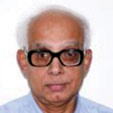
D. Balasubramanian
Director of Research, L. V. Prasad Eye Institute,Hyderabad, India.
A Ph.D. from Columbia University, he is Director of Research at the L. V. Prasad Eye Institute, Hyderabad. Earlier he was Director, Centre for Cellular and Molecular Biology, Hyderabad. Foremost among his research interests are molecular genetics and biology of eye diseases. He also works in the area of “Public Understanding of Science” through print, radio and TV programmes, and won UNESCO's Kalinga Award (1997) for popularisation of science. He is a Fellow of several national and international academies.
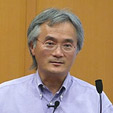
Paul Matsudaira
Professor of Biology and Biological Engineering,National University of Singapore,
Singapore
Professor Matsudaira heads the Department of Biological Sciences at the National University of Singapore (NUS) and is Director, NUS Centre for BioImaging Sciences. He was earlier Professor of Biology and Biomedical Engineering at the Massachusetts Institute of Technology and Director, Whitehead Institute - MIT BioImaging Centre. His research focuses on the structure and function of the cytoskeleton, and miniaturized ultra-fast bioanalytical devices.
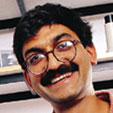
Satyajit Mayor
National Centre for Biological SciencesTata Institute of Fundamental Research
Bangalore, India.
A Ph.D. in Life Sciences from The Rockefeller University, he is Professor at the National Centre for Biological Sciences, Bangalore. He takes a multidisciplinary approach combining cell biology and molecular genetics with physics and chemistry to study the fine structure of plasma membranes and trafficking of proteins in membranes of living cells. He has developed tools to study trafficking of proteins in mammalian cells.
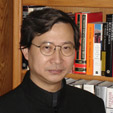
Yi Rao
Peking University Chair Professor andDean, Peking University School of Life Sciences,
Beijing, China
He has a Ph.D. from University of California at San Francisco. He is Professor and Dean, Peking University School of Life Sciences, and Associate Director for Academic Affairs at the National Institute of Biological Sciences, Beijing. He has two major research interests: molecular studies of neuronal polarity and genetic approaches to study the social behaviour. He is on the editorial board of several journals.
- Chemistry
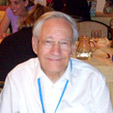
Richard. R. Ernst (Nobel Laureate in Chemistry 1991)
Professor emeritus, Lab fur Phyikalische ChemieWolfgang-Pauli-Str, Switzerland
He is Professor Emeritus at the Department of Chemistry and Applied Biosciences, ETH Zurich. Earlier, he was director of the Laboratory of Physical Chemistry at the ETH Zurich Chemistry and led research in magnetic resonance spectroscopy. He received numerous honours, including the Nobel Prize for Chemistry (1991) for his contributions to the development of the methodology of high resolution NMR spectroscopy.

Martyn Poliakoff, CBE FRS
School of ChemistryUniversity of Nottingham
Nottingham, United Kingdom
Sir Martyn Poliakoff, FRS, is Research Professor in Chemistry at the University of Nottingham. He works on gaining insights into fundamental chemistry and developing environmentally acceptable processes and materials. The core themes of his work are supercritical fluids, infrared spectroscopy and lasers. He is well known as the narrator of a 118-part series called The Periodic Table of Videos.
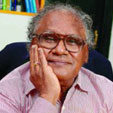
C. N. R. Rao, FRS
National Research Professor &President of Jawaharlal Nehru Centre for Advanced Scientific Research
Bangalore, India
Professor C. N. R. Rao, FRS, is Chairman, Science Advisory Council to the Prime Minister of India. He is also Linus Pauling Research Professor and Honorary President of Jawaharlal Nehru Centre for Advanced Scientific Research in Bangalore. He is a Distinguished Visiting Professor at several Universities and Fellow of all major science academies of the world. His research interests span Solid State and Materials Chemistry, Surface Science and related areas. In particular, he is interested in high temperature superconductivity in transition metal oxide systems, and synthesis and characterisation of designer solids.
- Physics
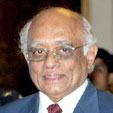
R. Chidambaram
Principal Scientific Adviser to the Govt. of IndiaVigyan Bhawan Annexe
New Delhi, India
He is the Principal Scientific Adviser to the Government of India and Chairman of the Scientific Advisory Committee to the Cabinet. Dr. Chidambaram’s research interests include neutron crystallography, hydrogen bonding, materials science, high pressure physics and nuclear technology. He was also a member of the Commission of Eminent Persons appointed by the Director General of International Atomic Energy Agency (IAEA) in 2008 to prepare a report on “The Role of the IAEA to 2020 and Beyond”.
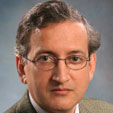
Jainendra K. Jain
Erwin W. Mueller Professor of PhysicsThe Pennsylvania State University
Pennsylvania, USA
A Ph.D. from State University of New York at Stony Brook, Jainendra Jain is Erwin W. Mueller Professor of Physics at Pennsylvania State University. He is a condensed matter theorist with interests in the area of strongly interacting electronic systems in low dimensions. He introduced the exotic particles, which he named composite fermions, for explaining fractional quantum Hall effect and related phenomena. He is a member of several international academies.
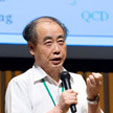
Makoto Kobayashi (Nobel Laureate in Physics 2008)
Professor emeritus, High Energy Accelerator Research Organization (KEK)Japan
He was educated on Nagoya University and obtained his Ph.D. in 1972. Along with Toshihide Maskawa, he proposed the so called Kobayashi-Maskawa model in 1973, when they were both in Kyoto University. In 1979, Kobayashi moved to KEK. The B-factory experiments at KEK (High Energy Accelerator Research Organisation) and SLAC have proven that their model describes CP violation of elementary particles correctly. He has been awarded a number of prizes, including the 2008 Nobel Prize in Physics.
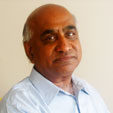
T. V. Ramakrishnan, FRS
Distinguished Associate, Centre for Condensed Matter TheoryIndian Institute of Science
Bangalore, India.
A Ph.D. from Columbia University, he is Distinguished Associate of the Centre for Condensed Matter Theory at Indian Institute of Science, Bangalore and is DAE Homi Bhabha Professor at Banaras Hindu University, Varanasi. His research interests include the physics of electrons, disordered systems, density functional approach to phenomena in classical condensed systems, and biological physics. He is a member of the Science Advisory Council to the Prime Minister of India. He is a Fellow of several national and international academies, including The Royal Society, London.

